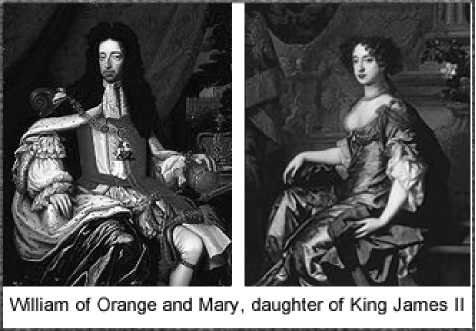When James II ascended to the throne, the English were afraid that he intended to return the nation to Catholicism. Parliament rebelled, and in the Glorious (bloodless) Revolution deposed James and offered the crown to his daughter Mary and her Dutch Protestant husband, William of Orange. They ruled jointly as William and Mary until Mary's death, after which William ruled alone as William III. In America, James II had created the "Dominion of New England" in an attempt to control all colonies down through New Jersey. He appointed as governor of the Dominion the tough, unyielding Sir Edmund Andros, who supported Anglicanism and sought to enforce the navigation acts, both of which infuriated the Puritan New Englanders. When the Bostonians learned of the overthrow of King James, they rioted and chased Governor Andros out of town, and he was deposed.

The Glorious Revolution had long-term effects on America: The philosophy that emerged from the event, elucidated in John Locke's Second Treatise on Government, became a cornerstone of American political thinking. The revolution (and Locke's explanation and justification of it) undermined claims for authoritarian government and argued essentially that men (and women) had the inherent right to participate in their own governance.
According to Locke, people had certain rights—to life, liberty, and property—and the government was responsible for protecting those rights for all citizens. Locke's thinking was invoked by Jefferson and the other founding fathers as justification for revolution and also as a basis for our Bill of Rights. Locally, the Revolution of 1688 helped propel the citizens of Massachusetts to overthrow Governor Andros.
Many new immigrants arrived in America during the period 1700-1750, increasing the population almost tenfold, a huge increase in terms of percentage. Many were non-English, including Germans and Scots from Northern Ireland, called Ulstermen (and later Scots-Irish). They settled heavily in Pennsylvania and migrated down through the Shenandoah Valley into Virginia and even farther south. The Ulster Irish had felt religious and economic oppression at the hands of their English masters and tended to be rebellious. When the time came for the Revolution, they fought the British in large numbers. From the ranks of the Ulster settlers came America's first Irish-American president, Andrew Jackson.
Germans came in large numbers, and in parts of Pennsylvania they outnumbered the English. They were good citizens—hard working and peaceful—and their religious practice blended nicely into the Quaker colony. They often found themselves culturally at odds with their English neighbors, but the Germans, like the Ulster Irish, were more interested in finding prosperity than in quarreling with the English or worrying about religious issues.




 World History
World History









